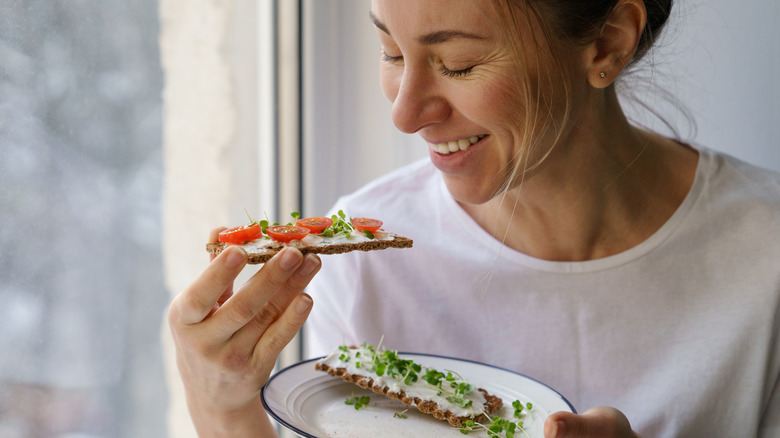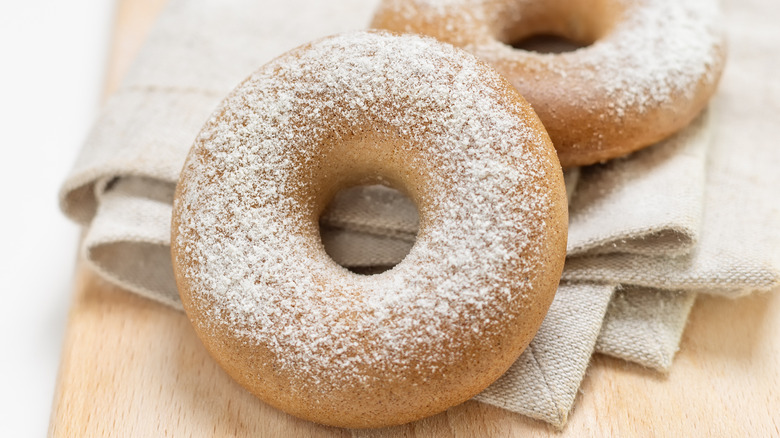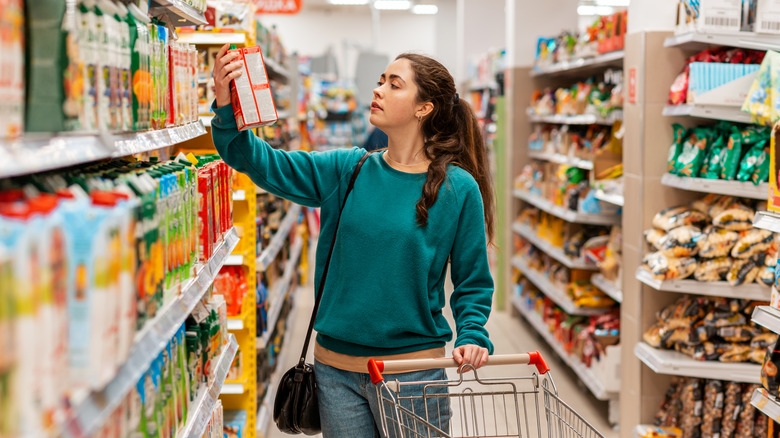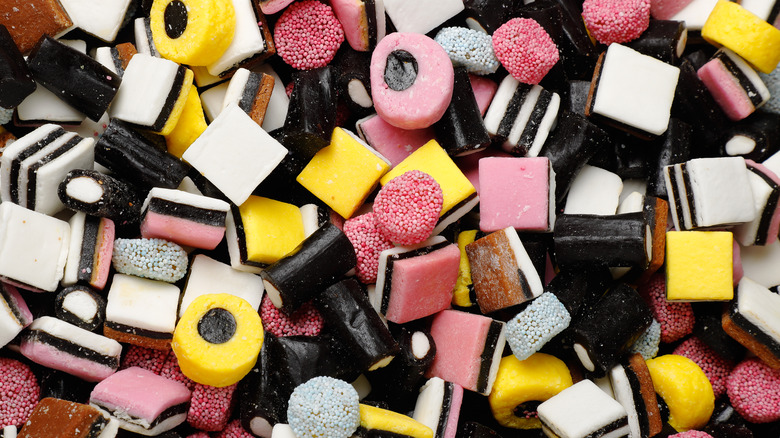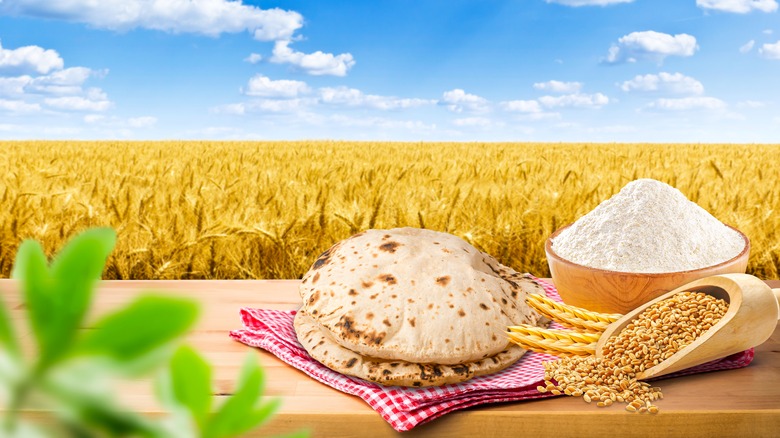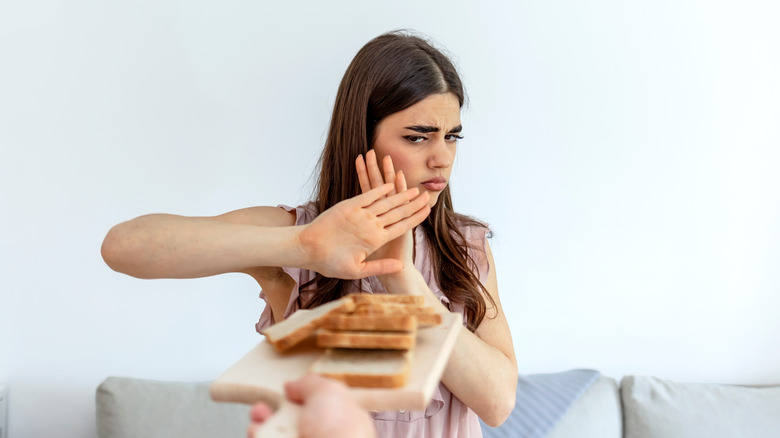Mistakes You Could Be Making When Following A Gluten-Free Diet
When done correctly, a gluten-free diet can be a lifesaver for those with gluten intolerance or celiac disease. But it's easy to make mistakes with such a restrictive dietary pattern that prohibits any foods containing wheat, rye, barley, and triticale (via the Mayo Clinic), or foods that may have come into contact with those grains. Common mistakes on a gluten-free diet include eating too many processed gluten-free foods, not getting enough of certain nutrients, not reading labels closely, not being careful enough with cross-contamination, forgetting that medications and supplements can contain gluten, and being too trusting at restaurants. Another big mistake people make is following a gluten-free diet when they don't actually need to.
If you do have gluten intolerance or celiac disease, following a gluten-free diet doesn't have to be so complicated as long as you can spot your mistakes and find some simple fixes. If you haven't been given a medical diagnoses that requires you to follow a gluten-free diet, then it's a good idea to talk with your doctor to see if there's any benefit to changing your eating patterns, or if you should just opt for a regular nutritious diet that doesn't necessitate restricting certain foods.
Thinking a food is healthy just because it's gluten-free
Those specialty gluten-free donuts don't contain gluten, but that doesn't mean they're good for you. A common misperception is that anything that's gluten-free is naturally healthy. It's not clear where this belief originates, but it's not true. The healthfulness of a given food isn't determined by its exclusion of wheat, rye, barley, and/or triticale, but rather by its content of micro and macronutrients and inclusion (or not) of ingredients like sugar and saturated fat, and how it's processed. Generally, the most unhealthy foods are high in sugar and saturated fat — candy, baked goods, soft drinks, and processed and fatty meats fall into this category (via Tameside). Processed foods labeled gluten-free can also be high in fat and sugar (via The Seattle Times). It may be because gluten is found in so many baked goods and desserts that it's automatically deemed unhealthy, or perhaps because gluten is often found in high-carbohydrate foods like bread and pasta, which have gotten a bad rap in the low-carb/keto diet world (via the Mayo Clinic). But bread and pasta made with whole-grain wheat, and other products made from whole-grains containing gluten, can be healthy and nutritious when consumed in moderation as part of a healthy diet (via Healthline).
Eating too many processed foods
A lot of gluten-free dieters get stuck in the gluten-free foods aisle because it feels like a safe space. When you see that a product is "certified gluten-free," you can breathe a sigh of relief, no label-reading required. But don't get caught in that trap. The foods in the gluten-free aisle are often heavily processed boxed and bagged foods, high in additives like sugar, sodium, and fat (via The Seattle Times).
The fact is, whether or not you need a gluten-free diet and whether or not a food is labeled gluten-free, the healthiest foods in the supermarket aren't found in the aisles. It's true! According to the Mayo Clinic Health System, the healthiest foods at the market are actually found in the perimeter of the store, in the produce, meat/fish, and dairy sections. These foods are typically fresh and unprocessed, and naturally gluten-free. When you do your gluten-free grocery shopping, stock up on fresh foods such as fruits, vegetables, fish, poultry, lean meat, eggs, and yogurt first; then head into the aisles with a selective eye for choosing minimally processed foods such as gluten-free whole grains, nuts, and beans (via The Seattle Times). Whether you need to avoid gluten or not, this is the recipe for successful grocery shopping for good health.
Not reading labels closely
Ingredient labels can be confusing. At the end of a long work day, the last thing you want to do is double check every ingredient while standing in the grocery store aisle. But it's so important. Now, a lot of problems can be solved by eating fewer packaged foods — fresh whole foods like vegetables and lean meat and fish naturally don't contain gluten (via Healthline). But, we totally get it — sometimes convenience and cravings win. The best thing you can do is learn by heart which ingredients on a label may contain gluten. The next best thing you can do is carry a list on your phone that you can easily access when you're in the market and too tired to think. According to the Celiac Disease Foundation, in addition to wheat, rye, barley, and triticale, you should look out for derivatives of these grains including barley, brewer's yeast, durum, einkorn wheat, farina, farro, emmer, graham, kamut, khorasan wheat, malt, semolina, spelt, wheat berries, and wheat starch.
Assuming that foods are gluten-free when they're not
With some foods, many people might not even bother to read the label because they just assume they're gluten-free. Nine out of 10 times they're probably right, but that one time they're wrong could make for a day of feeling pretty crappy. Some examples of foods people often assume are gluten-free but aren't include soy sauce and licorice (via the Celiac Disease Foundation). Soy is gluten-free, but soy sauce is made with wheat, and licorice root is gluten-free, but licorice candy typically contains gluten as a binding agent (via Beyond Celiac and Gluten-Free Living). According to BBC Good Food, other foods that are often unsuspected sources of gluten include sausages, bouillon, dry-roasted nuts, couscous, chocolate, cornflakes, French fries, rice cakes, mustard, curry powder, baking powder, flavored popcorn, and some varieties of soft, spreadable cheese. Not all of these foods will contain gluten, but it's important to know that these foods are more likely to contain it so you can be on high alert.
Missing out on important nutrients
Anytime you follow a diet that restricts certain foods or food groups, you risk becoming deficient in a single nutrient or groups of nutrients. To make matters worse, when you have celiac disease you may also have problems absorbing the same nutrients of which you're not getting enough, explains the Gluten Intolerance Group. Although many gluten-containing foods like breads, pastas, and cereals are often fortified with nutrients, gluten-free versions are typically not. According to Columbia Surgery, common nutrient insufficiencies in a gluten-free diet include B vitamins such as folate and vitamin B12, vitamin A, magnesium, calcium, iron, and fiber. To prevent this, ensure you eat enough naturally gluten-free foods that contain these nutrients, such as vegetables, beans, nuts, and gluten-free whole grains like amaranth, rice, millet, buckwheat, quinoa, sorghum, teff, and oats. Just be sure to choose oats labeled gluten-free, as oats are a common source of cross-contamination, according to a study published in Food Additives & Contaminants. Part A, Chemistry, Analysis, Control, Exposure, & Risk Assessment.
Being too trusting in restaurants
Even if you can't eat gluten, nowadays you have more choices than ever for dining out — especially if you live in a major city. Many restaurants offer gluten-free dishes, and some restaurants even offer entirely gluten-free menus (via Trips to Discover). If a restaurant is 100% gluten-free, it's a pretty good bet that you can freely choose any dish off the menu without worry. However, in restaurants that only offer select gluten-free dishes, it can be hard to ensure that everyone in the kitchen and on the wait staff are following best practices for avoiding cross-contamination. Does this mean you can't eat out at a regular restaurant? No. But it does mean you have to be selective and not just hope for the best.
Look for eating establishments that have gone through the Gluten Intolerance Group's Gluten-Free Food Services (GFFS) Validation Program, which helps restaurants educate and train their staff on gluten-free best practices. When you can't choose a GFFS-validated restaurant, you can reduce your risk of a dining-out disaster by avoiding fast food and quick-service restaurants that may have less time to double-check the safety of ingredients and prevent cross contamination (via the Gluten Intolerance Group). You can also call ahead to clearly communicate your needs, and choose to dine early or late when restaurants are less crowded and staff have more time to devote to your needs.
Cheating or giving in to cravings
We all get cravings and have a lack of willpower at times, which can lead us to make dietary choices that aren't in our best interests. Sometimes, the momentary pleasure we get from eating a food we shouldn't is worth the agony it causes us later — or at least it seems that way in the moment. But if you have celiac disease, repeatedly cheating and eating gluten foods can not only be uncomfortable in the short-term, but it can also lead to long-term health complications such as intestinal damage and nutrient deficiencies, osteoporosis, and some kinds of cancer (via the National Celiac Association). Even if you don't experience any negative effects immediately after consuming that crave-worthy gluten-filled food, it can still be causing damage to your intestines. A 2007 study from The American Journal of Clinical Nutrition found that even 10 milligrams of gluten per day could cause problems in some people with celiac disease.
Beating these cravings is no different than beating any other type of food cravings. Make sure to stay hydrated, as thirst can often be mistaken for hunger (via Physiology & Behavior). Eat regular meals to keep your blood sugar levels stable and prevent spikes in hunger that can lead to unhealthy food choices. Don't keep trigger foods in the house, if possible. Control stress and strong emotions if you are prone to stress/emotional eating. And make sure that your nutritional needs are being met, as nutritional imbalances can sometimes lead to your body craving what it is lacking (via Belinda Whelan).
Forgetting to vet medications and supplements
A common mistake on a gluten-free diet is forgetting that non-food items you ingest may also contain gluten. The U.S. Food and Drug Administration (FDA) requires food and supplement manufacturers to label products that contain certain allergens such as wheat (via Beyond Celiac). However, it does not require medications to have similar labeling, and some medications may contain small amounts of gluten that is used as a binder. Even this small amount can be enough to cause problems for people with allergies or celiac disease.
Your doctor may not be aware of gluten ingredients in the medications they prescribe. Contacting the manufacturer is the best way to confirm whether or not your medication contains gluten. You should also be aware that name brand and generic versions of medications may contain different ingredients, so just because one type is gluten-free doesn't mean the other is as well. Some red-flag ingredients to look for (other than wheat) on medication labels or package inserts that may alert you to the fact that the medication contains gluten include modified starch, regelatinized starch, regelatinized modified starch, dextrates, and dextrin. If barley malt is included, you should also look for dextrimaltose and caramel coloring.
The fact is that very few medications contain gluten; however, it's still important to do your homework and confirm with your doctor and the drug manufacturer to be sure that it is safe for you to take.
Not being careful enough with cross-contamination
If you live alone, keeping gluten out of your home is easy. However, if you have housemates or live with other family members who consume gluten, cross-contamination can be a real problem. If you have celiac disease, even a tiny amount of gluten crossing into your food preparation area can make you sick. However, a little vigilance goes a long way toward preventing cross-contamination in your kitchen. It's important to clean your kitchen counters thoroughly before and after food preparation. Beth Israel Deaconess Medical Center recommends using condiments in squeezable containers to prevent crumbs getting into open containers, or buying your own containers of condiments that you do not share with others. You can also store your gluten-free foods on separate, higher shelves in the cabinets and in the refrigerator. Label food containers and utensils that will only be used for your gluten-free foods, and avoid using wooden utensils and cutting boards, as they are porous and can absorb gluten particles. If you are using a shared grill, place your food on clean aluminum foil or in a cast iron pan, and use separate pizza stones when baking gluten-containing and gluten-free pizzas.
Not having support
Gluten-free diets can be tough to stick with, and the gluten-free lifestyle can be lonely when everyone around you is indulging in foods that can make you sick. This may cause some people to give up on their diets and suffer the consequences. And many people don't understand the importance of avoiding gluten when you have an intolerance or celiac disease. They don't realize that exposure to gluten can not only make you sick in the short-term, but also affect your long-term health. Therefore, you may need to help educate friends and family about why you have to take precautions to avoid gluten (via the Mayo Clinic). You can make meal prep a family affair by finding gluten-free recipes everyone can enjoy. Make going gluten-free fun for the family instead of a chore. You can also join a support group to share your experience and struggles with others who understand what you are going through (via Beyond Celiac).
Following a gluten-free diet when you don't need to
Avoiding gluten when you have a diagnosed wheat intolerance or allergy or celiac disease is crucial for your health and well-being (via Harvard Health Publishing). Some people may also have a gluten sensitivity that doesn't show up in testing but leaves them feeling bad after consuming gluten. In this case, it's also important to avoid the substance. However, many people who do not have these conditions try to follow a gluten-free diet to gain other benefits that have not been scientifically proven, and this can lead to health problems. For example, many dieters think that avoiding gluten can help them lose weight, however there is no evidence to support this (via Harvard T.H. Chan School of Public Health).
It's easy to make mistakes when following a restrictive diet such as gluten-free, which can lead to more complexity in your life you don't need at best, and at worst a poor diet and nutritional deficiencies. If you think you need to avoid gluten for health reasons, speak to your doctor about it first. It may be that there is a simpler and more effective way to lose weight or improve your medical condition through diet that doesn't involve cutting out a lot of foods as you are required to do on a gluten-free diet. For the average adult, eating a well-balanced, calorie-controlled diet including all the major food groups and exercising regularly is the best way to achieve and maintain optimal health (via the Dietary Guidelines for Americans 2020-2025).

